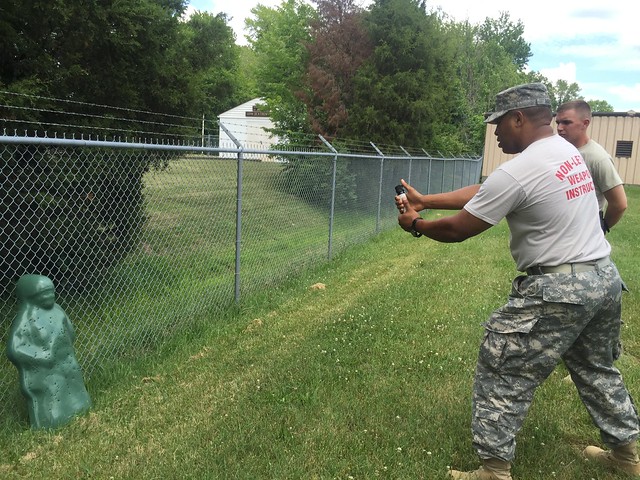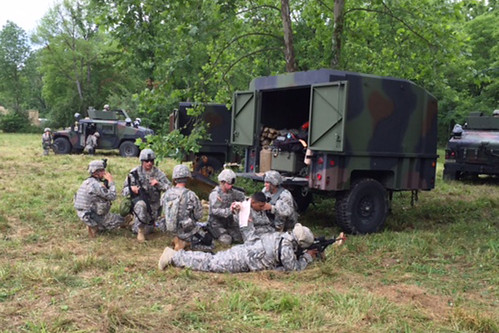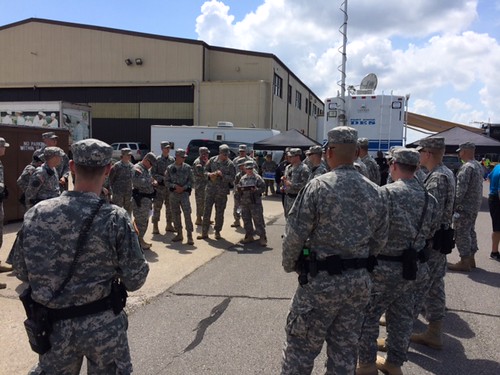Story by Sgt. 1st Class Rebecca Wood, 149th Maneuver Enhancement Brigade Public Affairs
[caption id="" align="aligncenter" width="522"]

Sgt. 1st Class Jacque Hayes, an instructor from the 198th Military Police Battalion, demonstrates the proper use of oleoresin capsicum spray as part of the law enforcement certification. Hayes conducted OC spray certification and contamination on all of the 1103rd MP DET Soldiers so they can meet the Law Enforcement Council requirements. (U.S. Army National Guard Photo by Sgt. First Class Emily Cooper)
RICHMOND, Ky. – The Kentucky National Guard’s 198
th Military Police Battalion conducted annual training in June at three vastly different training areas in an effort to maintain its legacy as a highly skilled and trained fighting force.
According to Maj. Tim Starke, battalion commander of the Louisville, Kentucky-based unit, each of the six companies trained at the platoon level to ensure overall readiness to conduct mobility support, policing and detention operations.
“It’s important for Soldiers to know field-craft and to not only survive, but also successfully conduct their mission while living out of their trucks and rucksacks,” said Starke. “The return to self-sufficiency in the field using organic military assets versus (units) relying on built-up infrastructure and contractor support results in Soldiers who can overcome adversity caused by inclement weather, sleep deprivation and continuous operations."
[caption id="" align="alignleft" width="380"]

Medics under the 617th Military Police Company conducts first aid at a Casualty Collection Point while under attack during a training exercise at Camp Atterbury, Indiana. This type of training conveys the concept of tactically immersed training for the Soldiers (Photo courtesy of 198th Military Police Battalion)
Mission Command
Headquarters and Headquarters Detachment, 198
th MP, 223
rd MP Company, 617
th MP Company and 940
th MP Company conducted command support and mobility operations at Camp Atterbury, Indiana.
The exercise simulated theater-opening operations, where platoons and squads focused on: route reconnaissance, route signing, convoy security, operating hasty detainee holding areas and conducting access control and base defense without support from a forward operating base.
This was 1
st Lt. Christopher Mostek’s first AT with the 223
rd MPs, and as a brand new platoon leader, he said the training “forced me out of my comfort zone.”
“It empowered me as a new platoon leader and helped me to get to know my Soldiers,” he said.
Mostek said the high intensity training and sleep deprivation made the training even more austere and realistic.
“When you are training like that, it pushes you to that point of exhaustion, but you keep going because you are part of a team,” he said. “My Soldiers maintained a positive attitude despite some tremendous adversity.”
Mother Nature didn’t cooperate with the MPs, dumping rain on the exercise for nearly a week.
“This is the first AT we’ve had where, for six-plus days, you only have your truck or a cover to sleep in,” said Spc. Alex Huesman, 2
nd Platoon, 940
th MP Company. “It rained almost every day so we were constantly facing the elements. I was miserable but it was great training.”
Huesman said the realistic scenarios – including the opposing forces (OPFOR) – added to the overall experience.
“The environment was realistic,” he said, “with legit ECP (entry control points) spots, OPFOR raids breaking through our ECPs in the middle of the night (and) 360-degree security.
“We had really good leadership involved in our training,” he said. “They were out there in the elements with us; and immediately after every mission we did a platoon or company-wide after action review. It made me feel real confident in my unit.”
[caption id="" align="alignright" width="380"]

Soldiers from the 1103rd Military Police Detachment receive a mission brief before they pull security for the annual Fort Knox Morale, Welfare and Recreation Concert on June 13, 2015. This mission, working side by side with active duty MPs, will certify them to work in a Law and Order capacity if activated (Photo courtesy of 1103rd Military Police Detachment)
Law and Order
The Louisville-based 1103
rd MP Company’s law and order mission requires law enforcement certifications regularly. The Kentucky Guardsmen partnered with the 34
th Military Police Detachment and the Fort Knox Department of Emergency Services to validate certifications.
“When you initially enlist as a MP, this is what you think you will be doing –traffic stops, enforcing the law, things a police officer does but on a base,” said Spc. Dakota Dockery. “So the best thing about this training is actually going out with the active duty Fort Knox MPs. It is a great learning experience.”
An active-shooter scenario provided some of the 1103
rd’s leaders, who are also civilian law enforcement officers when not drilling with the Guard, the ability to teach younger Soldiers the best practices for responding to active shooters.
“I personally liked moving through different scenarios in this closed-down school armed with paint rounds,” said Dockery. “It was awesome responding to the different situations and seeing how they played out.”
Detention Operations
The Murray, Kentucky-based 438
th MP Company also worked side-by-side with its active duty counterparts at Fort Leavenworth, Kansas. More than 100 Soldiers joined the 15
th MP Brigade to conduct military corrections operations inside the United States Disciplinary Barracks.
The 438
th MP Company’s first platoon leader, 2nd Lt. Hallie Freeman was one of the liaisons between the company and the Fort Leavenworth MP trainers.
“We tried to make it more of a right seat left seat,” said Freeman, “so that our less experienced Soldiers could see what it would be like to work detainee operations, how the guards and inmates interact, understand the struggles and hardships of being a guard and to see proper reaction times of situations that happen in the prison.”
Freeman said the Soldiers rotated through and shadowed the active duty guards while conducting random searches, observing the prison’s activities through the control room, and operating switches and video cameras; they also got experience monitoring the housing units, control points, individual cells and work details such as the barbershop or woodshop. After watching her Soldiers gain confidence in their training, she said there is a tremendous difference in their abilities.
“Before AT and if a deployment came up, I would say we weren’t ready,” said Freeman, “but after me and my guys worked at this facility, I would say now we are 100 percent ready to go.”
Conclusion
Starke said while the battalion doesn’t have the time or funding to train all units on each discipline every year during AT, they do have the ability to cross-train units using their subject-matter experts on each discipline and its associated tasks during drill weekends.
“We plan to leverage our junior NCOs and junior officers to build knowledge and capabilities across the battalion,” said Starke.
Starke also said they definitely plan on doing more ATs like this in the future.
“Soldiers of the Thoroughbred Battalion were fully engaged every minute of the AT period doing what they signed up to do—work within their MOS, whether that be MP, Cook, Mechanic, Admin Clerk or Medic,” said Starke. “Despite some difficult conditions, morale was high and leaders were far more proficient at the end than they were on first day of AT.”